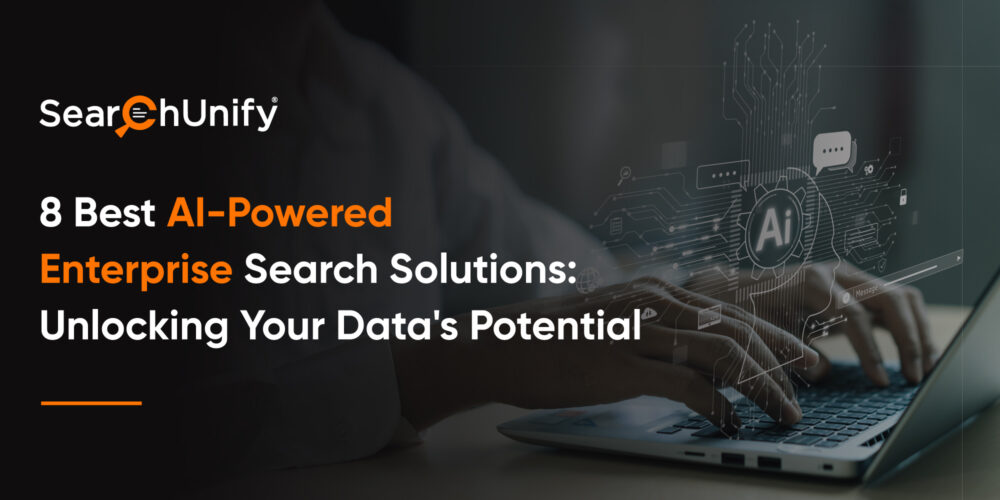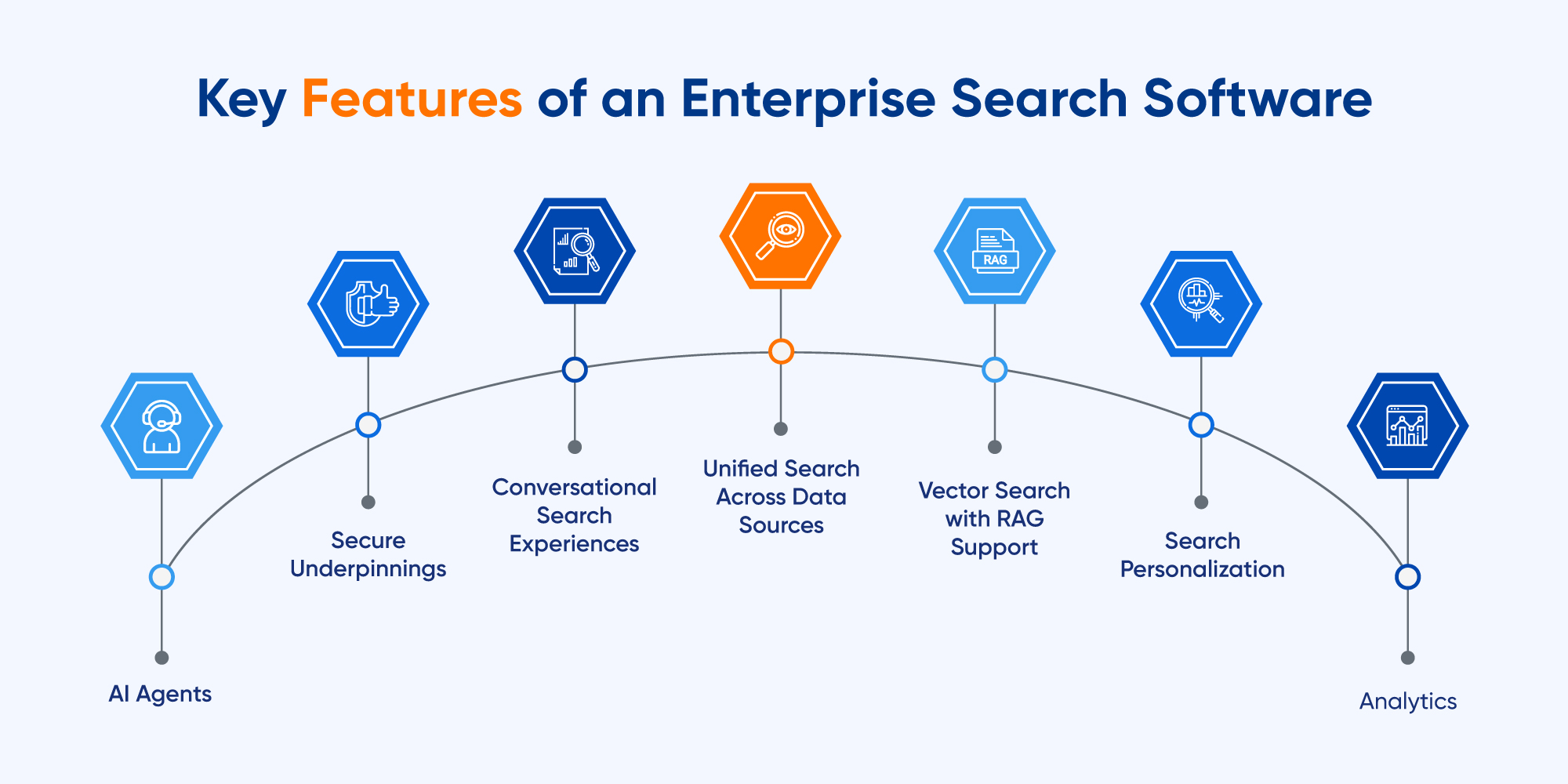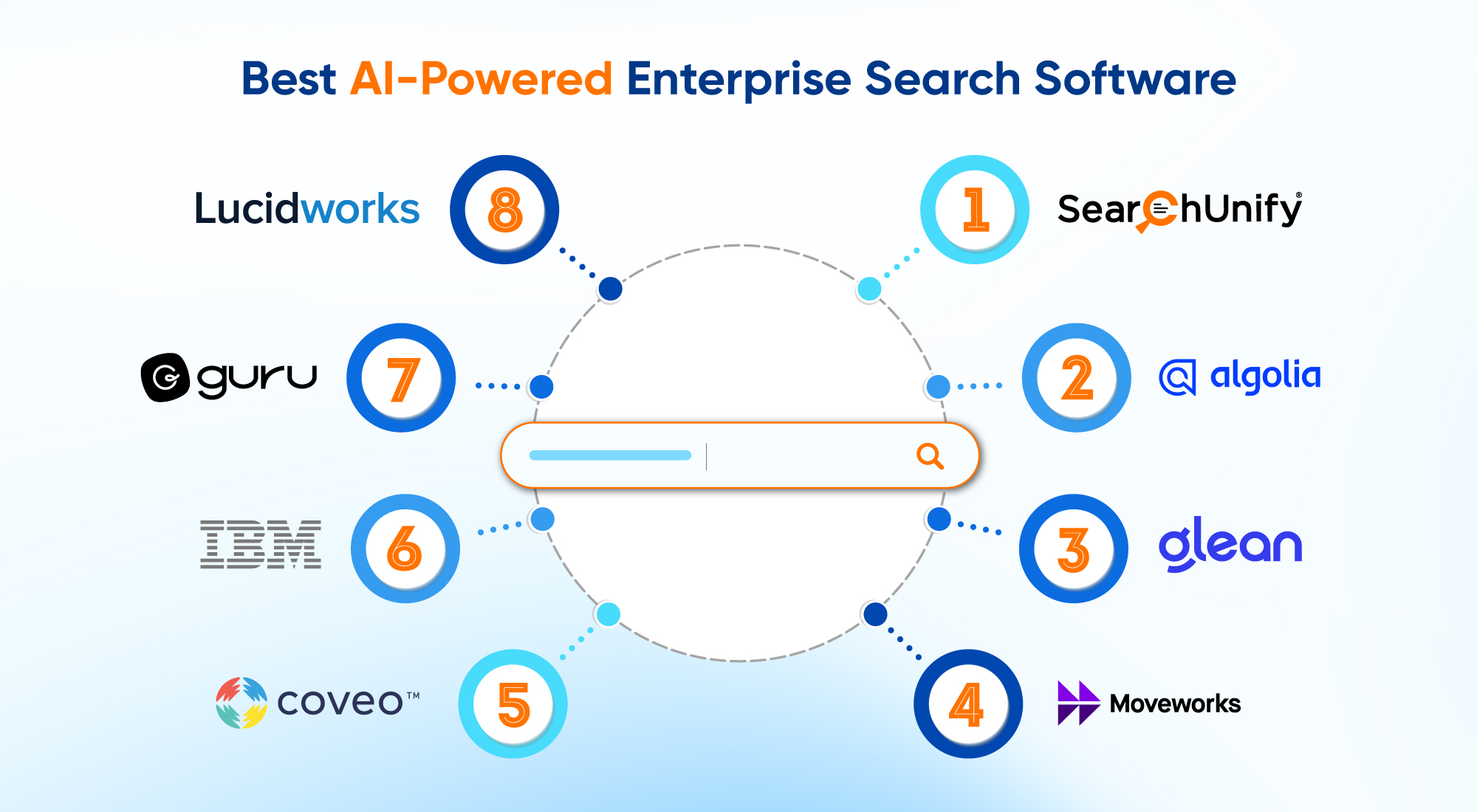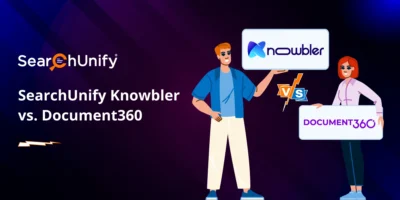
Enterprises are constantly generating high-value content. If accessible to users at the right time, this data can potentially drive broad-scale business outcomes. Instead, it ends up scattered in multiple silos.
According to McKinsey & Co., enterprise employees spend around nine hours a week searching for internal data. Even with this time investment, finding the right information isn’t guaranteed. This inefficiency can lead to hidden pitfalls and missed opportunities for the business.
In an era when AI capabilities are redefining what’s mainstream, turning once-complex processes into seamless, intelligent workflows—can it also transform content findability for enterprises?
The answer lies with AI-powered enterprise search software. These are leading the way in making content more accessible, relevant, and actionable, transforming content findability from an overlooked challenge to a pivotal growth driver. Read to find out more about the 8 best AI powered enterprise search software that empowers enterprises to stay ahead of the curve.
Why Enterprise Search?
By bringing siloed data closer to users, both internal and external, enterprise search has a profound impact on wide-ranging business functions. They ensure that employees, customers, and stakeholders can quickly access relevant information—unlocking data-driven business outcomes. The benefits open up multiple use cases for the business. Some of these are as follows:
For internal teams: driving efficiency and innovation
- Enhanced Productivity: Employees can focus on other strategic tasks by easing access to requisite information.
- Augments decision-making: Equips employees and leaders with accurate, real-time insights, enabling data-driven strategies, reducing guesswork, and fostering more informed business decisions.
- Fosters Seamless Collaboration: A unified search experience breaks down data silos enhancing cross-functional teamwork.
- Expertise Retention: Valuable institutional expertise remains accessible, preventing loss during employee transitions.
For External Users: Enhancing user experience for customers, partners, and other stakeholders.
- Customer Support: With expedited access to pivotal information, customers get faster query resolution, easing pressure on customer support teams, reducing escalations, and saving investment in customer support for the business.
- Amplifies customer loyalty: With better customer experiences, businesses stand a chance of retaining customers, fostering long-term relationships, and increasing brand advocacy.
- Simplifies omnichannel engagement: Ensures seamless and consistent information access across multiple channels—web, mobile, chatbots, communities, and more. Leading enterprise search solutions augment user experience, opening up opportunities for online retail, financial services, healthcare, IT services, and more, where digital interactions are critical for business success.
- Consistent Information Access: Partners and stakeholders can retrieve up-to-date, accurate content without manual intervention.
How does Enterprise Search work?
Enterprise search allows the users to retrieve information from diverse internal content sources and display results through a unified interface—embedded within the organization’s assets/tools. At a fundamental level, the following are the components of an enterprise search:
Essential Elements of Enterprise Search:
System Integration: The enterprise search software is integrated with the desired content sources of an enterprise. This establishes a bridge between the system and the data.
Data Crawling and Indexing: Enterprise search systems begin by crawling various data repositories of the organization—such as databases, file systems, and web applications, to collect information. Further, this data is indexed by the system.
Natural Language Processing (NLP): The data is interpreted by leveraging NLP techniques. This allows the system to comprehend the context and semantics of the indexed data.
Machine Learning: The ML algorithm allows the system to learn, adapt, and refine with time. This means the system gives personalized and accurate results, tailored to the user’s feedback.
Querying, retrieval, and output: The user inputs the desired search terms. The system processes the query using algorithms and retrieves information from the enterprise content sources. The results are then ranked and presented, often with filters and suggestions to refine the search further.
Bonus Read: The complete guide to enterprise search
Ready to unlock your enterprise data's full potential with AI-powered search?
Let’s TalkKey features of an Enterprise Search Software

Enterprise search software involves processes and technologies that work seamlessly to deliver optimal outcomes. Its features address diverse organizational needs, from data integration to advanced analytics. Below are some features that help in choosing the right enterprise search software.
AI Agents
Significantly, recent developments in AI are all about the “third wave of AI,” i.e., AI agents. Gartner has named this one of the top technology trends, and it has captured the imagination of enterprise leaders globally. AI agents are autonomous entities capable of acting independently, opening up a horizon of possibilities. AI Agents are one of the key features to incorporate in enterprise search in 2025.
Unified Search Across Data Sources
With data siloed across multiple content repositories, a robust enterprise search solution should enable users to access all relevant information from these repositories. It eliminates silos and provides a unified search experience that saves time and boosts productivity. To achieve this, federated search capabilities seamlessly execute information retrieval.
Conversational Search Experiences
With Gen AI gaining popularity in the past few years, users are getting accustomed to conversational experiences. This experience makes content findability more intuitive. By leveraging conversational AI, these solutions deliver more personalized and context-aware results, enabling users to locate information faster.
Search Personalization
The solution must deliver search results tailored to individual users based on their roles and preferences. This enhances efficiency and user experience. Advanced algorithms, such as machine learning and contextual awareness, improve personalization over time.
Vector Search with RAG Support
IDC identifies Vector search as the core feature in enterprise search solutions. With vector search the system can leverage semantic understanding and contextual relationships to offer related content. Moreover, it amplifies retrieval-augmented generation (RAG), which allows data to be dynamically retrieved from the organization’s internal repository and integrated into responses.
Analytics
Insights are key to measuring the performance of the software. Comprehensive analytics, leveraging real-time data give a bird’s eye view of how effectively the users are engaging with the software. For instance, metrics like top searches, unsuccessful searches, and low-click searches can provide valuable information about user behavior and preferences.
Secure Underpinnings
Enterprise search software must prioritize robust security to protect sensitive organizational data and maintain compliance with regulatory standards. Security features ensure that data access is limited to authorized personnel and that it remains protected against internal and external threats.
8 Best AI-powered Enterprise Search Software

Search software can form a powerful core engine for an organization. By providing a strong foundation, they open up multiple use cases making them the Swiss army knife for enterprise operations. From enhancing internal productivity to transforming online retail to redefining how businesses view customer support—as such enterprise search software opens up multiple possibilities. We discuss the 8 best AI-powered enterprise search solutions with distinct capabilities.
SearchUnify
SearchUnify Cognitive Search elevates the search experience by delivering relevant and personalized search results. With built-in connectors, the solution can be integrated with popular enterprise tools and content sources. In-house technologies such as SearchUnifyFRAG and the SCORE framework augment information retrieval and avoid LLM hallucinations.
Further, it identifies user queries by detecting intent, better understands meaning with contextual query embeddings, and ensures data consistency at scale with smart indexing. Capabilities like document annotation with content tagging, token extraction, and PII flagging further enhance content processing and retrieval. Along with contextual results, users are better informed with rich snippets and direct answers. In addition to elevating the search experience, SearchUnify offers detailed analytics on search performance and user behavior insights for the business to aid data-driven decisions.
Moreover, SearchUnify is a leading enterprise agentic platform that offers not just an AI-powered enterprise search but a suite of solutions tailored to enterprises’ customer support needs. In addition to the cognitive search solution, enterprises can choose to deploy a virtual assistant (SUVA), an Agent Helper, and/or a knowledge management solution (Knowbler). These solutions leverage purpose-built AI agents for seamless self-service and autonomous workflows.
Primary Industry Focus: Customer Support for Enterprises
Deployment: SaaS
Rating on G2: 4.5/5
Key Features
- Leverages KNN and ANN for more contextual and faster self-service.
- Rich Snippets, Knowledge Graphs, and direct answers to enhance the search experience.
- Granular permissions and access controls for user types.
- Transparent pricing and quick deployment timelines.
- Flexible LLM selection: Enterprises can choose between SearchUnify partner LLMs or their own LLM.
Bonus Read: Cornerstone OnDemand’s Unified CX & EX Strategy With Searchunify
Glean
Founded in 2019, Glean Enterprise Search has been developed as an AI-powered workplace search platform. It is designed to enhance the productivity of an enterprise by giving internal users quick and accurate access to information across various internal tools and databases. Glean enterprise search delivers relevant results by taking into account the context of the query. Additionally, it personalizes the output by respecting employee relationships unique to the enterprise.
Primary Industry Focus: Business and productivity software
Deployment: SaaS
Rating on G2: 4.8/5
Key Features:
- Unified Search: Offers a single search bar that integrates data from multiple content sources.
- User-Friendly Interface: Features an intuitive and clean interface with smooth data flow.
- Quick Access to Experts: Identifies and connects users with subject matter experts within the organization for specific queries.
- Scalability: Designed to scale with organizational growth, accommodating increasing data volumes and user numbers.
- AI-Powered Relevance: Utilizes advanced AI algorithms to deliver contextually relevant search results tailored to individual user needs.
Algolia
Algolia provides SaaS enterprise search solutions for websites. The product is more focused on the end users of customer-facing businesses. The solution offers intuitive search experiences across websites, mobile apps, and enterprise platforms.
Algolia is more tailored to the eCommerce industry. In addition to enterprise search, it offers solutions like AI browse, AI recommendations, and others for eCommerce use cases. Additionally, it comes with seamless integration options for platforms like Shopify, Salesforce, and BigCommerce. However, in comparison to other enterprise search solutions, Algolia can get expensive for businesses with complex requirements.
Primary Industry Focus: eCommerce
Deployment: SaaS
Rating on G2: 4.3/5
Key Features:
- Semantic and Keyword Search: Combines semantic understanding with traditional keyword matching to accurately interpret user intent.
- Query Categorization: Organizes search queries into relevant categories, ensuring users receive the most pertinent results.
- Dynamic Re-Ranking: Automatically adjusts search result rankings based on content popularity and user behavior.
- Integration Capabilities: Offers seamless integration with platforms like BigCommerce, Shopify, and Salesforce Commerce Cloud.
- Flexible pricing options.
Coveo
Coveo Search Platform is another AI powered search solution. It supports search clients for both, customer-facing and internal assets. Deployed on the cloud, like other enterprise search SaaS solutions, it offers search as a service. The solution has been developed to cover multiple industries—rather than a defined focus for a specific industry. It leverages semantic search to offer contextual results. Coveo Search Platform is compatible with mainstream enterprise tools such as Salesforce, Zendesk, Microsoft Azure, Slack, and others. However, compared to some of the competitors, Coveo can take a longer time to ROI.
Primary Industry Focus: – NA –
Deployment: SaaS
Rating on G2: 4.3/5
Key Features:
- Unified Search: Consolidates information from diverse tools in use by the organization.
- Personalization: Tailors search outcomes to individual user preferences and behaviors.
- Scalability: Designed to handle large volumes of data and users.
- Ease of use: Intuitive and performs well.
- Compatibility: Integrates with various platforms and applications.
Guru
Guru is one of Glean alternatives for a similar use case. It is designed to optimize information access for enterprises by establishing a channel for teams within the organization. Content can also be shared via this channel. With its search capabilities, Guru can be used to enhance internal processes like streamlining employee onboarding, supporting sales enablement, and more.
Primary Industry Focus: Productivity software for internal teams.
Deployment: SaaS
Rating on G2: 4.7/5
Key Features:
- Browser Extension: Users get access to information through a browser extension.
- Analytics Dashboard: Offers insights into content usage and engagement.
- Customizable Templates: Provides templates to standardize information capture
- Real-Time Sync: Information is updated in real-time across all devices and platforms
- API Access: Allows for integration with other tools and systems
- AI-Powered Suggestions: Utilizes artificial intelligence to proactively suggest relevant information based on the context of the user’s work.
IBM Watson Discovery
IBM Watson Discovery is an AI-powered enterprise search solution that offers functionalities for organizations to organize large volumes of data. Leveraging technologies such as natural language processing (NLP) and features such as OCR, entity analysis, and category analysis, it generates insights to amplify operational efficiency and aid decision-making. Its features make it a valuable AI-powered enterprise search tool for enterprises aiming to enhance their content findability capabilities and derive actionable insights from their data. Since it offers similar capabilities, IBM Watson Discovery is also a robust Glean alternative.
Primary Industry Focus: Productivity solution for internal teams.
Deployment: SaaS
Rating on G2: 4.5/5
Key Features:
- Smart Document Understanding (SDU): Trains the system to recognize and interpret structural elements of documents, such as fields, footers, tables, and images.
- OCR: Extracts insights from images containing text.
- Federated Search: Generate insights from multiple data sources.
- Synonym Support: Recognizes and processes synonyms to ensure comprehensive search results.
- Analytics: Provides insights into user behavior and search performance.
Moveworks
Moveworks Enterprise Search is designed to augment workplace productivity. It leverages semantic search to give results. It is compatible with a variety of internal and external tools. Thus it can integrate seamlessly with existing systems of most enterprises. Leveraging AI-powered search and an intuitive user interface can enhance an enterprise’s content findability workflows.
Primary Industry Focus: Productivity solution for internal teams.
Deployment: SaaS
Rating on G2: 4.6/5
Key Features:
- Reasoning Engine: Enhances search accuracy and reliability by understanding employee goals and developing intelligent search plans.
- Analytics: Provides insights into search adoption and usage.
- Scalability: Supports large data volumes.
- Global Availability: Deployed across multiple regions, including the US, Canada, EU, and Australia.
- Access Controls: Ensures that employees access only the information they are authorized to view.
Lucidworks
Lucidworks is an AI-powered enterprise software that covers multiple use cases. Their flagship platform, Lucidworks Fusion, leverages machine learning and natural language processing to deliver personalized and relevant search experiences. By federating data from various sources, Fusion enables users to access critical information efficiently. It is used internally by enterprises and also by online commerce businesses.
Primary Industry Focus: Productivity solution for internal teams.
Deployment: SaaS
Rating on G2: 4.5/5
Key Features:
- Data Connectors: Offers connectors to integrate with various data sources.
- Scalability: Designed to handle large volumes of data and users.
- Personalization: Delivers personalized search experiences.
- Faceted Search: Allows users to filter and refine search results based on specific attributes.
- Analytics: Provides insights into search performance and user behavior.
Evaluating Enterprise Search Solutions
With each of these solutions offering distinct advantages, choosing the right fit needs evaluation from multiple perspectives. Consider the following parameters for arriving at the decision.
- Evaluate AI Capabilities: With the tech ecosystem’s accelerated march towards Agentic AI adoption, enterprise strategies are increasingly pivoting along this progressive technology.
- Security: Evaluate security measures.
- Fault Tolerance architecture: Mitigate outages-driven business loss with a robust fault tolerance that replaces failed components with backups—ensuring high availability with minimal data loss
- Value Proposition: The pricing models for these solutions can vary by a significant margin. The higher the price the harder it will be to achieve ROI.
- Ease of Integration: Data has to be unified from all your content sources. Prioritize a solution with pre-built connectors, or a platform that offers ease of integration.
- Deployment & Support: Consider scalability, customization, and the quality of vendor support.
- Flexibility with LLM: These have been pivotal to evolving search experiences of Enterprise solutions. However, with the rate at which the technology is progressing, each LLM brings something unique to the table. Hence, organizations prefer the freedom of choice—considering features, cost factors, and/or more.
Wrapping Up
With accelerated development in AI technologies, enterprises have the opportunity to re-imagine their legacy processes. Content findability, an often undermined business function, has the potential to transform workflows, turning potential pitfalls into a source of strength.
We discussed the 8 best AI-powered enterprise search software that push the envelope for innovative solutions, allowing enterprises to maintain a competitive edge and position content findability as a strategic priority for sustained growth. Each of these have distinct advantages.
However, if the possibility of Agentic AI-powered Cognitive search solution fits your business use case, schedule a personalized demo of SearchUnify to explore how the platform can drive efficiency and unlock growth for your enterprise.











